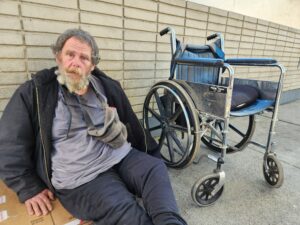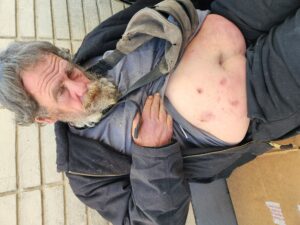Tom Covington curled up to sleep in a downtown Chico doorway on a January night near another unsheltered man. Both men were awakened around 2 a.m. by a flaming bag that was tossed on them and that burned Covington’s sleeping bag, hand and his right side.

Covington was able to slap the fire out, but the men were disgusted and angry to find that the bag was full of feces. Covington’s wheelchair had been taken by one of the two men who had been lurking around them when they bedded down.
Covington, a congenial man who was recently interviewed on Second Street as he sat on two slabs of cardboard on a cold sidewalk, was treated and released at the emergency room the morning of the attack. He still has four or five small skin wounds healing from the burns.
It was not Covington’s first time being assaulted while sleeping in public. And according to the North State Shelter Team that had contact with Covington this week, his sleeping bag and other belongings were stolen sometime this morning or last night.
The Jan. 26 incident that caused the stomach burns was reported to Chico Police Department, and Lt. Jeff Durkin said that several officers arrived and talked to Covington. Chico police retrieved his wheelchair near the corner of Ninth and Flume streets.
“They have a pretty good idea of what happened, it’s just a matter of identifying the suspect,” Durkin said.
Covington has his own opinion about what happened: “It was definitely a hate crime. It stinks that people out here don’t like me. I’m an easy target.”
Homeless people like Covington and their advocates say these incidents might appear to be hate crimes because they are perpetrated by people targeting those who do not have shelter. But neither federal or California State law make unhoused people a protected class under hate crime law. And experts say that criminalization policies and the speech of elected officials may even encourage such violence.
National Homeless Law Center Senior Policy Director Eric Tars said that under federal law, to bring a claim of hate or discrimination a person must prove they were discriminated against because of an unchangeable feature, such as their ethnicity. Tars said people can fall in or out of homelessness, precluding them from belonging to a protected class.

Tars said that Chico is an example of a city where there has been dehumanizing speech and policy directed toward homeless people. He said that this was especially clear following the Camp Fire when the unhoused were divided between what some people called “deserving” and “undeserving.”
Policy & Language
City leaders were called out for perpetuating and allowing certain speech by U.S. District Judge Morrison England Jr. in 2021, who oversaw the lawsuit Warren v. Chico that was filed by eight unhoused plaintiffs.
Councilmember Sean Morgan was criticized that year for comments about “moving” homeless people from the city and discussing the lawsuit in a KPAY radio interview. In that interview, he called the suit: “A hostage situation. That’s what it is. And we have two choices. We can give them what they want. Or we can take it all the way to the Supreme Court of the United States.”
Chico councilmembers, including Morgan, did not respond to requests for comment.
National Coalition for the Homeless Executive Director Donald Whitehead said in an interview with ChicoSol that his organization has been tracking violent incidents against people for 20 years, and the organization has seen an increase in “both lethal and non-lethal” assaults.
“We think it’s a direct result of another thing in the country that’s increased — the criminalization of people experiencing homelessness,” Whitehead said. “We have seen multiple cities resort to criminalization and resort to laws that make it basically illegal to be homeless.”
Both experts said they think that eviction sweeps that uproot homeless people produce isolation, making those people more vulnerable and visible. This makes the likelihood of attacks higher as officials maintain “dehumanizing” messaging around homelessness, Whitehead said.
“To me, it opens the door to behaviors that are more drastic like the violence you see,” Whitehead said. “If we continue to see elected leaders place unhoused people in these positions based on policy, then we’ll continue to see an uptick in violence.”
In response to a Public Records Act request filed by ChicoSol, the City of Chico said it requested authorization -– as required by the court –- to conduct 13 eviction sweeps during the course of 2023. The sweeps have continued into this year.
Whitehead thinks that there is a responsibility for an elected leader to model humanizing language toward homeless people, “because these are human beings we’re talking about.”

“Any time violence is carried out, our elected leaders should react to that,” Whitehead said. “But it goes back to a reluctance to treat them like human beings.
“When the government gives its blessing to thinking about homeless people as criminals, as less deserving of rights by passing policies like those that criminalize their basic survival, then it actually facilitates this kind of behavior by private individuals. It says it’s OK to discriminate, it’s OK to treat people as less than human and not deserving of human rights. The reaction should be, ‘Let’s get our neighbors in housing,’ not ‘Let’s punish them for trying to survive on the streets.’”
In the meantime, people on Chico’s streets each night like Covington struggle with the elements, sometimes debilitating health conditions and hostility from some community members.
Covington is dependent on his wheelchair because of a host of disabilities; he lost his left arm to gangrene and then amputation after an oven accident in 2015, and most of his left side is paralyzed after a major stroke in 2010.
Covington told ChicoSol that he knows the two men who attacked him by sight, but is reluctant to identify them for fear of retaliation. He’s baffled by bullying he faces on an almost daily basis from other individuals. One man in particular, he said, harasses him by driving by and heckling.
“He uses a power soaker on me,” Covington said. “He looks for me. One time he hid my sleeping bag.”
His goal is straightforward but seemingly out of reach, given that his only stable income is SSI — Supplemental Security Income. “I want an apartment I can afford,” Covington said.
Natalie Hanson is a contributing editor to ChicoSol. Leslie Layton is editor of ChicoSol.
(This story was produced with support from Ethnic Media Service’s Stop The Hate initiative, made possible with funding from the California State Library in partnership with the California Commission on Asian and Pacific Islander American Affairs.)

What a sad and shocking story. What has happened to our spiritual ethics? Why don’t we hear from our Pastors and ministers on our shelter crisis and related violence? It has been shown in many studies that a community can save money by providing basic shelter e.g. managed campgrounds, safe car parks and tiny homes in church parking lots compared to the otherwise additional emergency services costs.
I wonder that every day… how can some show such inhumanity to people? How have we become so morally bereft? And what future ground are we paving with our current actions?
Chico legislators present setbacks, not cooperation to those who offer solutions, time and concern to ease suffering. Shockingly, leaders model outright antagonism toward people and programs helping the least able, as with the hurdles and accusations foisted on Safe Space winter shelter in the midst of our worst storms — City Mgr’s predicated an emergency Council meeting based on SS’s emergency move to the City Hall public plaza as “… disruption of activities at city hall”). And with the lack of management or partnership with churches and organizations like North State Shelter Team offering solutions for the designated campground at Eaton/Cohasset.
Weekly now, I read that cities across CA and the US are implementing models to assist those in need: Gilroy’s Quality of Life PD officers; Red Bluff’s new navigation center; Redding’s Housing Incentive Program and tiny home options in many cities and states.
Where are the ethics, the compassion?
Thomas is a messy person who has no regard for cleaning his mess up & think the community owes him something. Not saying that being targeted & having ur things stolen is right. I was homeless for 5 yrs lived at the pallet shelter & now have my own place
I’m downtown everyday, the word “congenial” is shocking to me. My interactions with him are almost always less than pleasant and I talk with and am friends with a number of the street folk. Thomas has no regard or care for other people or the messes he leaves behind. It’s terrible someone chose to throw a flaming bag of feces on him but he’s not as innocent as he makes himself out to be.
Thank you for covering this man’s situation. I wanted to address “messiness.” I think people give up in different ways. It can be shocking or off putting but as we’ve seen at Safe Space it is a learned thing. People change according to norms and expectations when they aren’t in degraded circumstances. It isn’t fair or kind to make note of a person’s worst quality when they are so down and out. How can we move his situation out of life threatened is the most pertinent thing. Shelter and services, not judgement, same for others.
After consulting with North State Shelter Team’s Charles Withuhn, who knows Tom and has spoken with him many times, a friend and I went to Big 5 this morning and bought Tom a sleeping bag and large duffel bag. Charles will deliver these to Tom. Regarding the reports that Tom is a less-than-pleasant person, it’s possible I wouldn’t care for him if I met him. But I’m still glad we did this. I am reminded of this quote from the Trappist Monk and radical theologian Thomas Merton: “Our job is to love others without stopping to inquire whether or not they are worthy.” Tom Covington, above all other things, is a human being in need.
What has happened to our humanity, our empathy, our love for fellow humans? What is this inapt instinct of some people to kick others who are already down. I occasional ran into Tom near my bank and gave him money. He was always grateful and respectful.
Last night I personally saw a man in a white heavy duty pickup drive by and spray Thomas with water (it was a chilly night, too).
I have known Thomas from before, occasionally stop to chat or give him a push to where he needs to go in his chair. I I’ve also personally witnessed people drive by and yell insults at him.
I myself have never had a bad interaction with the guy, but even if I did …Jesus, the guy’s got one arm, legs that barely work, and more health problems then you can count. God forbid if the man isn’t a fking ray of sunshine all the time or doesn’t clean up after himself.
I kinda know Tom’s backstory, sounds like dude has definitely made some mistakes in life, but if you’re gonna drive by a man in a wheelchair and spray him with water on a cold night -while you’re driving around in a warm, comfortable truck- there is something majorly, MAJORLY wrong with you.
And, something is majorly wrong with this community as a whole.